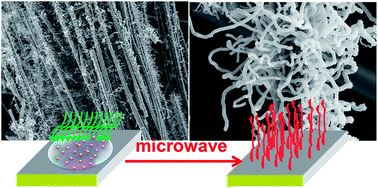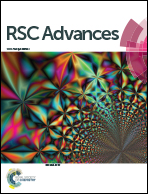An ultrafast microwave approach towards multi-component and multi-dimensional nanomaterials
Abstract
Sea-urchin like, multi-component, 3-D nanostructures have been synthesized using a microwave assisted approach, which is called the “PopTube” method. This microwave approach has the advantages of high-efficiency and selective heating, simple experimental conditions and instrument setups, which provides a facile and ultrafast technique to obtain three dimensional nanomaterial growth on various engineering material substrates. It takes at most 15–30 s to grow carbon nanotubes (CNT) on top of a wide selection of substrate surfaces, such as indium tin oxide (ITO) nanopowders/glass, carbon fibers and milled glass fibers. Moreover, metal oxide nanostructures such as iron oxide can also be produced via this process without any extra chemical reagents. The process can be performed with a kitchen microwave oven, at room temperature and ambient conditions, without the need for any gas protection or high vacuum. Multi-component and multi-dimensional nanomaterials synthesized by this approach are good candidates for chemical, biological and electrochemical applications.


 Please wait while we load your content...
Please wait while we load your content...